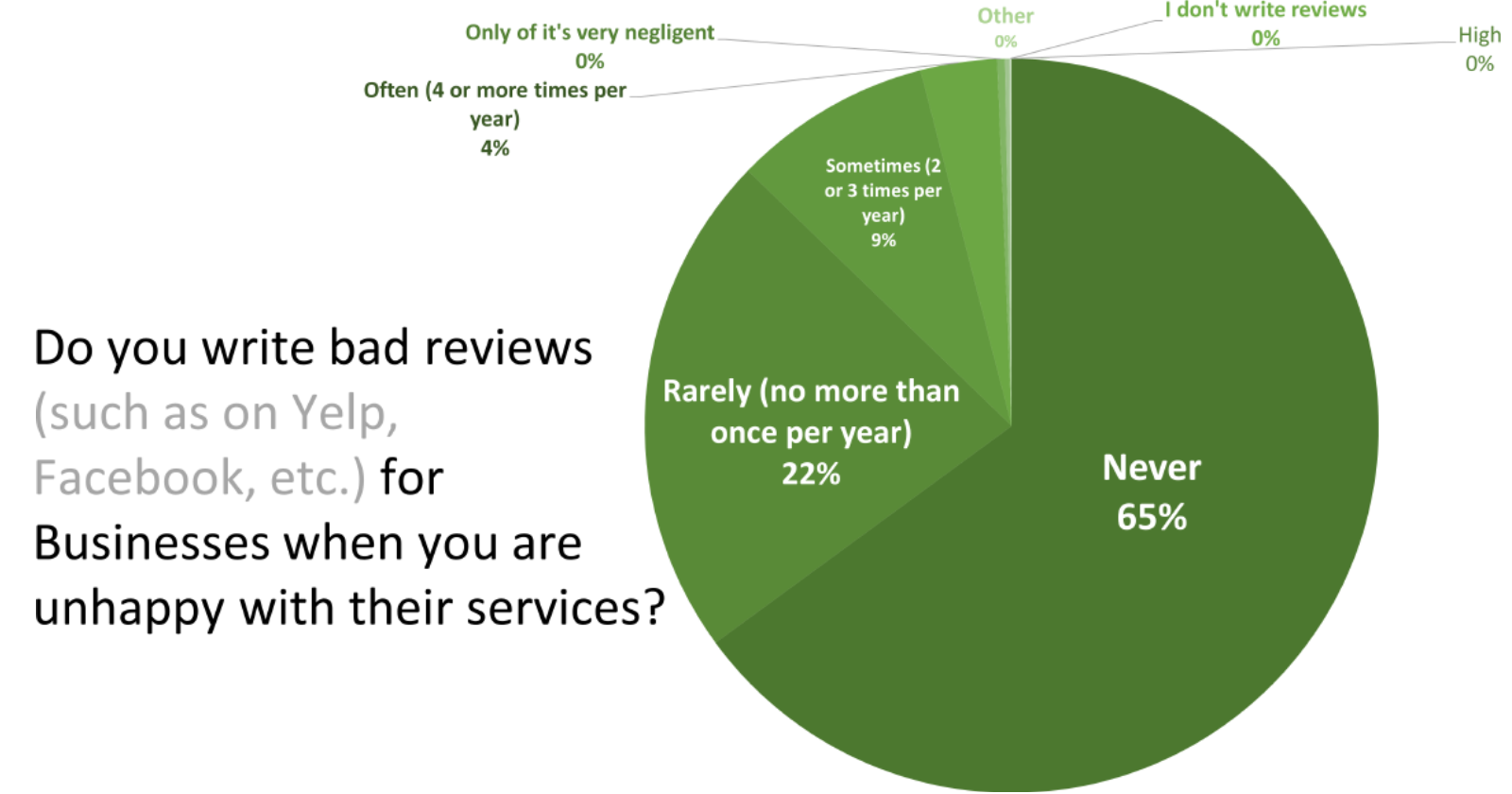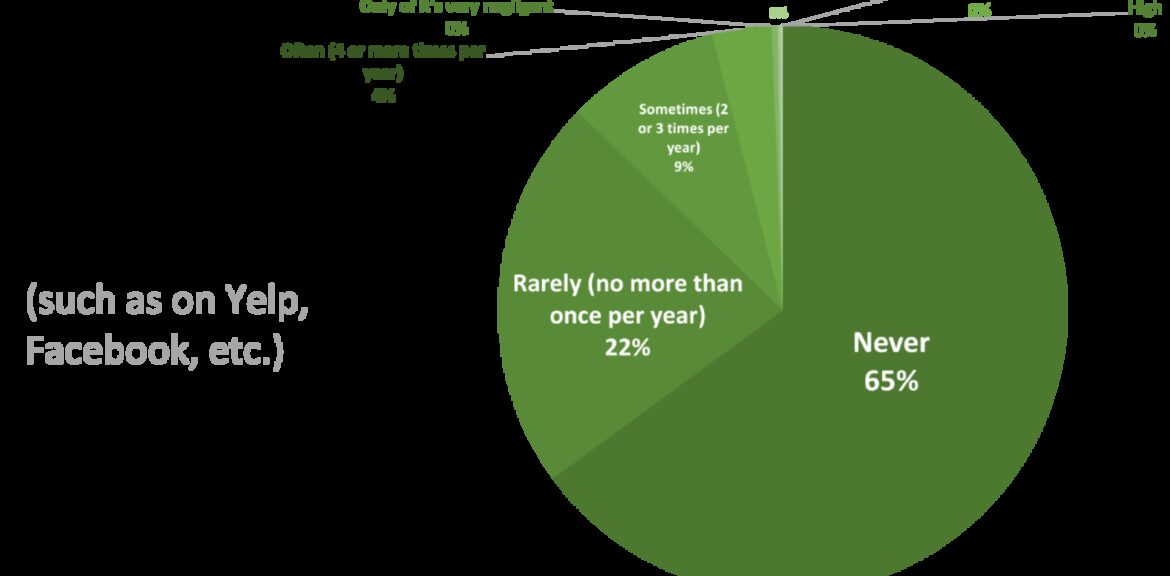This post was sponsored by ReviewInc, opinions expressed in this article are the sponsor’s own.
You get that notification of a new review in your inbox.
Next, you hold your breath and recite a short prayer before opening the email.
You’re bracing yourself for a negative review.
Business owners like you regularly experience this dread; you know a picture can say a thousand words – so can a review (even with a character limit).
We know consumers rely heavily on reviews for their business decisions.
Therefore, your first thought may be to put your best foot forward and avoid any negativity like the plague.
However, sometimes bad is good.
Should I Remove Negative Reviews?
You may be surprised, but no, do not delete negative reviews.
It seems counterintuitive, but trust us – negative reviews have a very positive impact on your brand, sales, and search engine result page (SERP) visibility.
Let us explain.
Can Bad Reviews Be Good?
Yes! Bad reviews can be good, especially when we’re talking about online reviews.
Why Is Some Negativity Good When It Comes To Online Reviews?
Unbelievably, having too many positive reviews can be a red flag to consumers.
More people will trust a 4.7 rating than a perfect 5-star rating, according to a study by ReviewInc.
This is because some businesses “game,” falsify, or provide payment and exchanges for positive reviews – and customers know this.
Customers know when something feels too good to be true, and when this happens, they often decide to take their business elsewhere.
Also, the FTC has a lot to say about bribing customers for good reviews and gaming the system (and what they have to say is not what you want to hear).
That being said, a good rating that includes negative reviews is a strong indicator of authenticity, regardless of the platform.
We know what you’re thinking next.
How Often Do People Leave Bad Reviews?
The good news is bad reviews are not as common as you would think.
In 2022, ReviewInc conducted a survey and found that 65% of people do not leave bad reviews when they have a negative experience.
That is great news!
It is also interesting to note there was no measurable difference in the gender; all genders reported an equal rate of avoiding writing negative reviews.
In other words, the likelihood of getting a positive review is much higher than getting a negative review.
Based on ReviewInc’s overall measurements, 92% of reviews are positive (and 96% of the positive reviews are 5-star ratings).
Less than 5% of reviews 1-star reviews.

Results from ReviewInc Google Survey, January 2022
So, what are the exact reasons why negative reviews are good for your business?
Let’s dive into how bad reviews can actually boost your brand.
How Negative Reviews Help SEO & Online Reputation Management
By keeping your bad reviews in place and managing those reviews with online review management tools, your star ratings can:
- Help improve your overall SEO & visibility in search.
- Increase trust, loyalty, and customer base.
- Give insights into how you can improve your business for future growth.
1. Negative Reviews Provide Authentic SEO
Reviews and ratings on sites like Google, Facebook, and Yelp factor in Google search engine optimization rankings.
Google describes how reviews play a role in prominence in SEO rankings. Specifically, “High-quality, positive reviews from your customers can improve your business visibility and increase the likelihood that a shopper will visit your location.”
Encouraging all reviews and responding to them is a good practice that will enhance your local SEO and your online reputation.
When it comes to negative reviews, they tend to provide a necessary balance, as an abundance of fake “positive” reviews or biased reviews can result in all the reviews being suspended from a key review site which will heavily impact SEO.
Regardless, don’t fear a negative review, there is good news.
2. Negative Reviews Build Brand Trust & Loyalty
“The average review score on Yelp is 3.65, which is the lowest out of these platforms. The average reviews on the other major platforms are 4.42 on Facebook, 4.3 on Google, and 4.25 on TripAdvisor.” (Neil Patel)
While those numbers, especially on Yelp, can seem scary, the truth is that reviews are trust-building mechanisms that help customers know what they are getting into before purchasing.
In short, bad reviews are a necessary ingredient of authenticity, which ultimately can lead to more sales.
The trick is to use a sympathetic response, which will:
- Help future customers understand the context of a bad review.
- Show future customers that you understand their needs and will work to accommodate them.
- Show reviewers that you are there for them.
With this technique, a previously bad reviewer may actually update their review to a higher star rating.
According to Google’s guidelines, “When you reply to reviews, you post publicly as your business. Replies may not appear across Google immediately. However, reviewers will get a notification when you reply to their review. After they have a chance to read your reply, they can update their review.”
How Do I Respond To Negative Reviews?
We know that bad reviews often feel like bad news, but a well-crafted reply can neutralize the effect.
Responding appropriately to a negative review can also be seen by other customers.
How you handle the situation will matter more than the negative review. (Here are some tips on replying to a negative review).
Responding to reviews shows that a business cares about its service and reputation.
The response alone engenders higher confidence in a company.
3. Negative Reviews Help Improve Business Operations & Profits
So, what about that 1-star review?
There is a genuine benefit from negative reviews and what their intent should be.
Negative reviews tell a business what it needs to fix and improve.
This is especially important in today’s competitive environment.
Sometimes criticism can make us better as people and businesses.
If a customer has a frustrating experience and writes a review, it will draw your attention to an issue you may not have noticed:
- Is there a faulty product?
- Does a team member need guidance?
Not all bad reviews need to end a business – they can be an opportunity to improve and strengthen customer service.
How To Manage All Your Reviews
The high importance of online reviews and star ratings makes it necessary to have an online reputation management strategy.
It is vital to monitor your reviews, campaign for more reviews, and have a strategy to respond to all reviews.
After all, your response might influence a negative review to change into a positive one.
This strategy will enhance both a business reputation as well as its SEO.
With reputation management software, businesses can have a team overseeing their online reputation and all reviews left.
A good service will also have tools that help you compose responses and manage them.
The software allows your business team to respond quickly and appropriately, so you do not have to handle the stress of negative reviews.
Image Credits
Featured Image: : Phoenixns/Shutterstock
Go to Source
Author: ReviewInc




